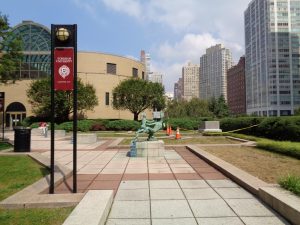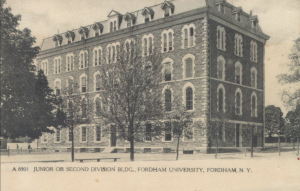Coffey Break: The History of Rose Hill’s Athletic Field
Named after a Fordham sports leader, Jack Coffey Field has left a mark on athletes and spectators alike
Fordham Photograph Collection
The field that would become Jack Coffey Field, overlooking the Rose Hill Gymnasium.
April 29, 2022
One is bound to be awestruck while walking through the Rose Hill campus. Its neo-Gothic architecture feels like something out of a fantasy novel and leaves a lasting impression on visitors.
What may be overlooked as people traverse the grounds nestled between bustling intersections is the spacious field that hosts Fordham’s varsity baseball, football and soccer teams. While it does not feature the carefully constructed masonry of Keating Hall, the artificial turf and aluminum bleachers of Jack Coffey Field hold a special place in Fordham’s storied history.
Baseball was played at Rose Hill before the campus assumed the name “Fordham.” As St. John’s College, 18 Rams made it to the major leagues, including Hall of Fame pitcher Edward “Big Ed” Walsh. After the college was renamed Fordham University in 1907, Jack Coffey, who graduated from Fordham University in 1910, was one of the school’s first ballplayers to play professional baseball.
At Fordham, Coffey was a solid enough player to receive a chance in the major leagues.
At Fordham, Coffey was a solid enough player to receive a chance in the major leagues. Most of his post-Fordham baseball career was spent in the minors, but after a call-up in 1918, he received opportunities to play with Hall of Famers Ty Cobb and Babe Ruth.
It was after his playing days were over that Coffey left his indelible mark on Fordham athletics. In 1922, he became the head coach of the baseball team. Over the ensuing years, Coffey led the group to 1,160 victories, making him one of only 59 college baseball coaches to amass over 1,100 wins. Alongside his work as a baseball coach, Coffey served as Fordham’s athletic director until his retirement in 1958.
While the baseball team has used the same facilities since 1930, it was not until 1954 that the field was named in honor of Coffey — just four years before his departure from the school. While Coffey’s ties to Fordham are defined by baseball, Fordham’s connection to the field that takes his name is not. The field is now most closely associated with the university’s football program.
Today, Coffey Field hosts the football, soccer and baseball teams.
Fordham administrators also elected to cease operations of the football team in 1954. But it was on Jack Coffey Field in 1964 that students revived the school’s football team, resurrecting it as a club sport. By 1970, varsity football was back at Fordham, and the team called Coffey Field home.
Today, Coffey Field hosts the football, soccer and baseball teams. Over the years, the complex grew and developed. Concession stands and bathrooms were built underneath the newly renovated aluminum bleachers overlooking the football and soccer field in 1990.
Whether you care about sports or can’t tell a Frisbee from a volleyball, one thing is certain: The history of Rose Hill is not complete without acknowledging the legacy of Jack Coffey Field.
To enhance the playing experience at Coffey Field, the grass of the field itself was overhauled in 2005 and replaced with full turf. The baseball field was also completely renovated and named after Jim Houlihan, Gabelli School of Business ’74. A former baseball player at Fordham and current member of the board of trustees, Houlihan donated $1 million to support the baseball program.
As it currently stands, Coffey Field and Houlihan Park are integral to many athletic programs at Fordham. Coffey Field also serves many nonvarsity athletes at Rose Hill, remaining available to all students while also hosting intramural and club sports.
There are many buildings and areas at Rose Hill that receive admiration from students, visitors and teachers. But few have had as tangible of an impact as Coffey Field. Named after a pivotal leader in Fordham sports history, the complex has witnessed Fordham with and without football, hosted thousands of students in its bleachers and stood steadily as a mainstay while buildings sprung up around it.
Whether you care about sports or can’t tell a Frisbee from a volleyball, one thing is certain: The history of Rose Hill is not complete without acknowledging the legacy of Jack Coffey Field.
















